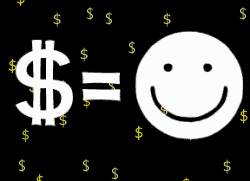A few days ago, I published the article “Nothing Will Make You Happy,” which introduced readers to a controversial claim made by Harvard professor of psychology, Dan Gilbert. In the TedTalk, “The Surprising Science of Happiness,” Gilbert stated that after a year, a paraplegic and a lottery winner will have similar capacities for happiness.
The reason for this is because human beings have developed a psychological immune system that automatically distorts our perception of our own circumstances, automatically making positive perceptions of even bad situations. He called this kind of happiness – synthetic happiness. What this information implies is that external situations do not necessarily affect a person’s capacity for happiness.
The notion that one can be happy even if one was poor, or ugly, or obese, or unhealthy, or unsuccessful, is very comforting for the least motivated of us – me, at least.
However, Gilbert also mentioned the effect of freedom on our capacity for synthesizing happiness. People with less freedom find it easier to rationalize their situation. People with more freedom are not as good with creating synthetic happiness. Knowing that making one choice over another will not improve your situation, your brain starts to rationalize why it’s okay to stop trying because “this isn’t so bad.” But as long as we know that we are capable of acquiring or achieving more, we will inevitably be unsatisfied with our current status. My own freedom and “potential” may be preventing me from achieving a perfect state of synthetic happiness.
Now, I’ll still be as capable of happiness as a rich person even if I was poor. Yes, I can still be happy, but overwhelming evidence suggests that I’ll be happier if I was not poor.
Happiness and sadness are not two sides of a coin. These states exist in a spectrum. Some are simply happier than others. The problem with happiness is that it’s not easy to measure because there are plenty of factors that can increase or decrease happiness. It’s hard to tell what exactly makes a person happy.
The article, “Money, Marriage, Kids,” by Chuck Leddy, for example, explains how having money, being married, and having children can influence a person’s happiness. So, a rich person who isn’t married, and has no children, may self-report less happiness than a person with less (but enough) money, who is married and has children.
We’re not going to be 100% sure what makes other people happy, but there is evidence that there is a positive correlation between money and happiness.

In 2008, Justin Wolfers, an Australian economist and public policy scholar, wrote a six-part article series called, “The Economics of Happiness”, in Freakonomics.com:
Part 1: Reassessing the Easterlin Paradox
Part 2: Are Rich Countries Happier than Poor Countries?
Part 4: Are Rich People Happier than Poor People?
Part 5: Will Raising the Incomes of All Raise the Happiness of All?
If you’re not inclined to read all of that evidence, you can find a summary of the same data in The New York Times article, “Maybe Money Does Buy Happiness After All,” by David Leonhardt.
If you don’t want to read that either, here’s Wolfers’ conclusions:
The facts about income and happiness turn out to be much simpler than first realized:
1) Rich people are happier than poor people.
2) Richer countries are happier than poorer countries.
3) As countries get richer, they tend to get happier.Moreover, each of these facts seems to suggest a roughly similar relationship between income and happiness.
There is no ambiguity here. Money makes people happy. However, it’s still possible to have plenty of money and not be happy.
In a research paper published in the Journal of Consumer Psychology (2011), Elizabeth W. Dunn, Daniel T. Gilbert, and Timothy D. Wilson suggested that “If money doesn’t make you happy, then you probably aren’t spending it right.”
In the same paper they proposed very useful recommendations on how people can maximize the amount of happiness they buy with their money. The abstract of the study reads as:
“The relationship between money and happiness is surprisingly weak, which may stem in part from the way people spend it. Drawing on empirical research, we propose eight principles designed to help consumers get more happiness for their money. Specifically, we suggest that consumers should (1) buy more experiences and fewer material goods; (2) use their money to benefit others rather than themselves; (3) buy many small pleasures rather than fewer large ones; (4) eschew extended warranties and other forms of overpriced insurance; (5) delay consumption; (6) consider how peripheral features of their purchases may affect their day-to-day lives; (7) beware of comparison shopping; and (8) pay close attention to the happiness of others.”
To conclude, here’s a quick FAQ for possible questions that might still be lingering in the reader’s mind:
Is a poor person as equally capable of happiness as a rich person? Yes.
Is it possible for a poor person to be happier than a rich person? Yes.
Would poor people be happier if they had more money? Yes.
Are poor people, on average, just as happy as rich people? No.
There is no single path to happiness.
One can earn it through achievements, one can find it in marriage and in children, one can “synthesize” happiness out of “nothing,” and it turns out, one can also buy it (as long as one knows what kind of purchases provide happiness).
So, to those who have plenty of money, here’s a terrible pun, “Happy shopping!”
Image Source:
http://younginvestorsoftoday.com/wp-content/uploads/2014/05/money-buys-happiness.gif

